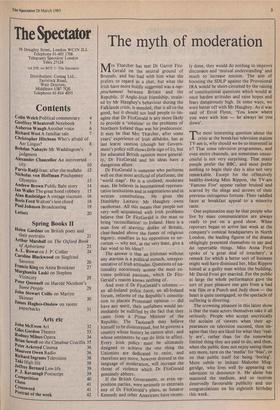The myth of moderation
Mrs Thatcher has met Dr Garret Fitz- Gerald on the neutral ground of Brussels, and has had with him what she prefers to regard as a chat, but what the Irish have more boldly suggested was a rap- prochement between Britain and the Republic. If Anglo-Irish friendship, strain- ed by Mr Haughey's behaviour during the Falklands crisis, is mended, that is all to the good, but it should not lead people to im- agine that Dr FitzGerald is any more likely to provide a 'solution' to the problems of Northern Ireland than was his predecessor. It may be that Mrs Thatcher, after some years' experience of Irish debacles, has at last learnt caution (though her Govern- ment's policy still shows little sign of it), but for educated British opinion more general- ly, Dr FitzGerald and his ideas have a dangerous allure.
Dr FitzGerald is someone who performs well on that most artificial of platforms, the 'world stage'. He is a civilised, moderate man. He believes in international represen- tative institutions and in negotiations and in written constitutions. He gives the Dimbleby Lecture: Mr Haughey owns racehorses. All this means that people not very well acquainted with Irish problems believe that Dr FitzGerald is the man to bring 'reconciliation' to Ireland. Here is a man free of atavistic dislike of Britain, clear-headed above the fumes of religious bigotry, steadfast in his opposition to ter- rorism — why not, at the very least, give a fair wind to his ideas?
The answer is that an Irishman without any atavism is a political eunuch, unrepre- sentative of Irish attitudes. Questions of na- tionality notoriously arouse the most ex- treme political passions, which Dr Fitz- Gerald's reason knows nothing of.
And even if Dr FitzGerald's schemes — an all-Ireland police force, an all-Ireland forum, reforms of the Republic's constitu- tion to placate Protestant opinion — did have any merit, their usefulness would im- mediately be nullified by the fact that they came from a Prime Minister of the Republic. The Taoiseach may believe himself to be disinterested, but he governs a country whose history he cannot alter, and whose sentiments he can do little to affect. Every Irish policy must be ultimately designed to achieve the one thing the Unionists are dedicated to resist, and therefore any move, however dressed in the language of moderation, will increase the threat of violence which Dr FitzGerald genuinely abhors.
If the British Government, or even op- position parties, were seriously to entertain any of Dr FitzGerald's plans, as Senator Kennedy and other Americans have recent- ly done, they would do nothing to improve discussion and 'mutual understanding' and much to increase tension. The aim of boosting the SDLP against the Provisional IRA would be short-circuited by the raising of constitutional questions which would at once harden attitudes and raise hopes and fears dangerously high. In some ways, we were better off with Mr Haughey. As it was said of Errol Flynn, 'You knew where you were with him — he always let you down'.
?The most interesting question about the 1 crisis at the breakfast television station TV-am is, why should we be so interested in it? That some television programmes, and even entire channels, are sometimes unsuc- cessful is not very surprising. That many people prefer the BBC, and most prefer nothing to begin their day is also not very remarkable. Except for the offensively healthy-looking Miss Rippon, the TV-am 'Famous Five' appear rather bruised and scarred by the slings and arrows of their previous outrageous fortune. Their raddled faces at breakfast appeal to a minority taste.
One explanation may be that people who live by mass communication are always ready to put on a good show. When reporters began to arrive last week at the company's comical headquarters in North London, the leading figures of the drama obligingly presented themselves to say and do reportable things. Miss Anna Ford spoke of 'a great deal of treachery', a remark for which a better sort of business might well have dismissed her, Miss Rippon hinted at a guilty man within the building, Mr David Frost got married. For the public at large the whole performance gave the sort of pure pleasure one gets from a bad war film or a Punch and Judy show — the heart is quite unengaged, so the spectacle of suffering is diverting.
The crowning pleasure in this latest show is that the main actors themselves take it all seriously. People who accept uncritically the acclaim of viewers when their ap- pearances on television succeed, then im- agine that they are liked for what they 'real- ly are', rather than for the somewhat limited thing they are paid to do, and then, when the public does not enjoy seeing them any more, turn on the 'media' for 'bias', or on that public itself for being 'boring'. More subtle to imitate Malcolm Mug- geridge, who lives well by appearing on television to denounce it. He alone has mastered the medium, and so receives deservedly favourable publicity and our congratulations on his eightieth birthday this week.














































 Previous page
Previous page